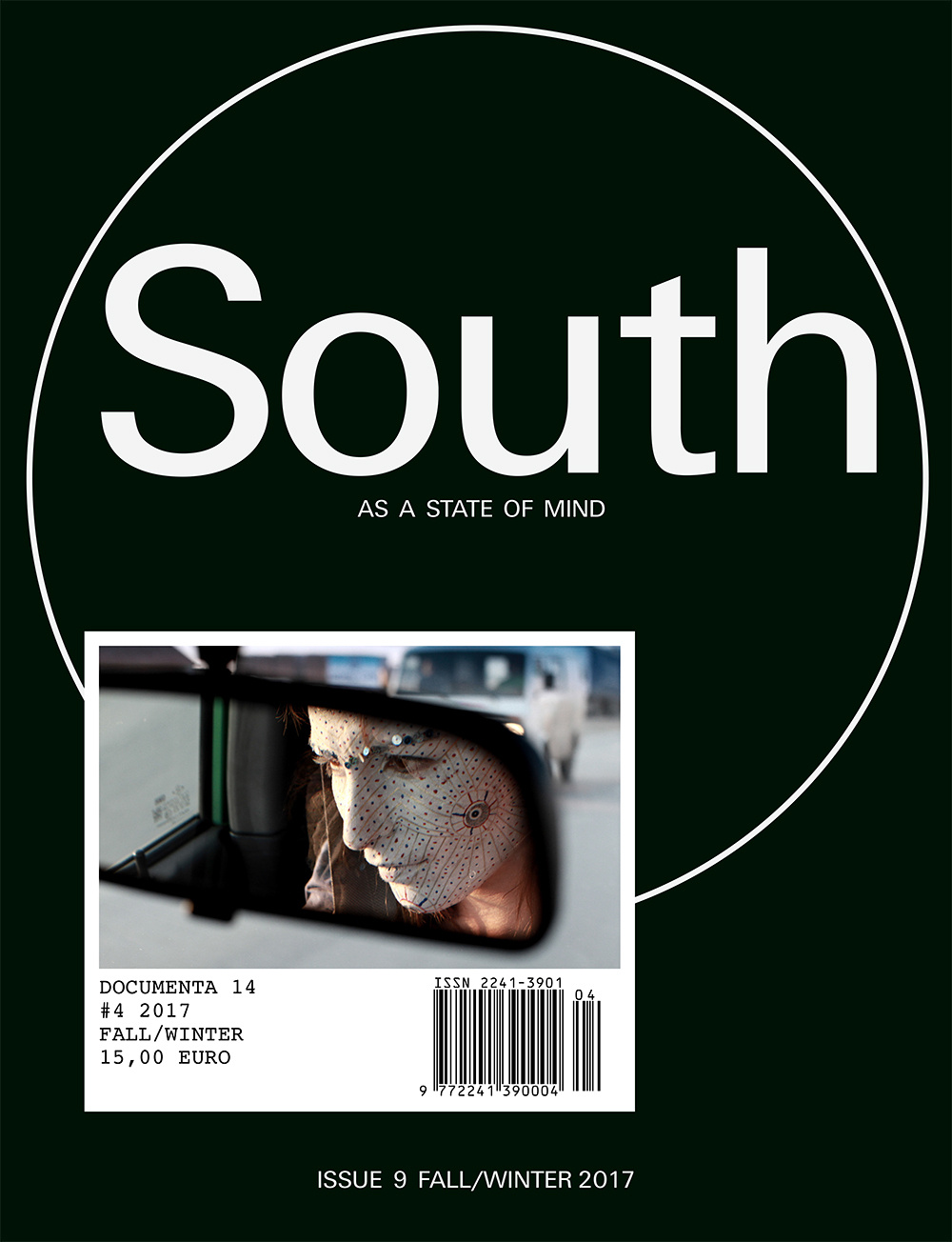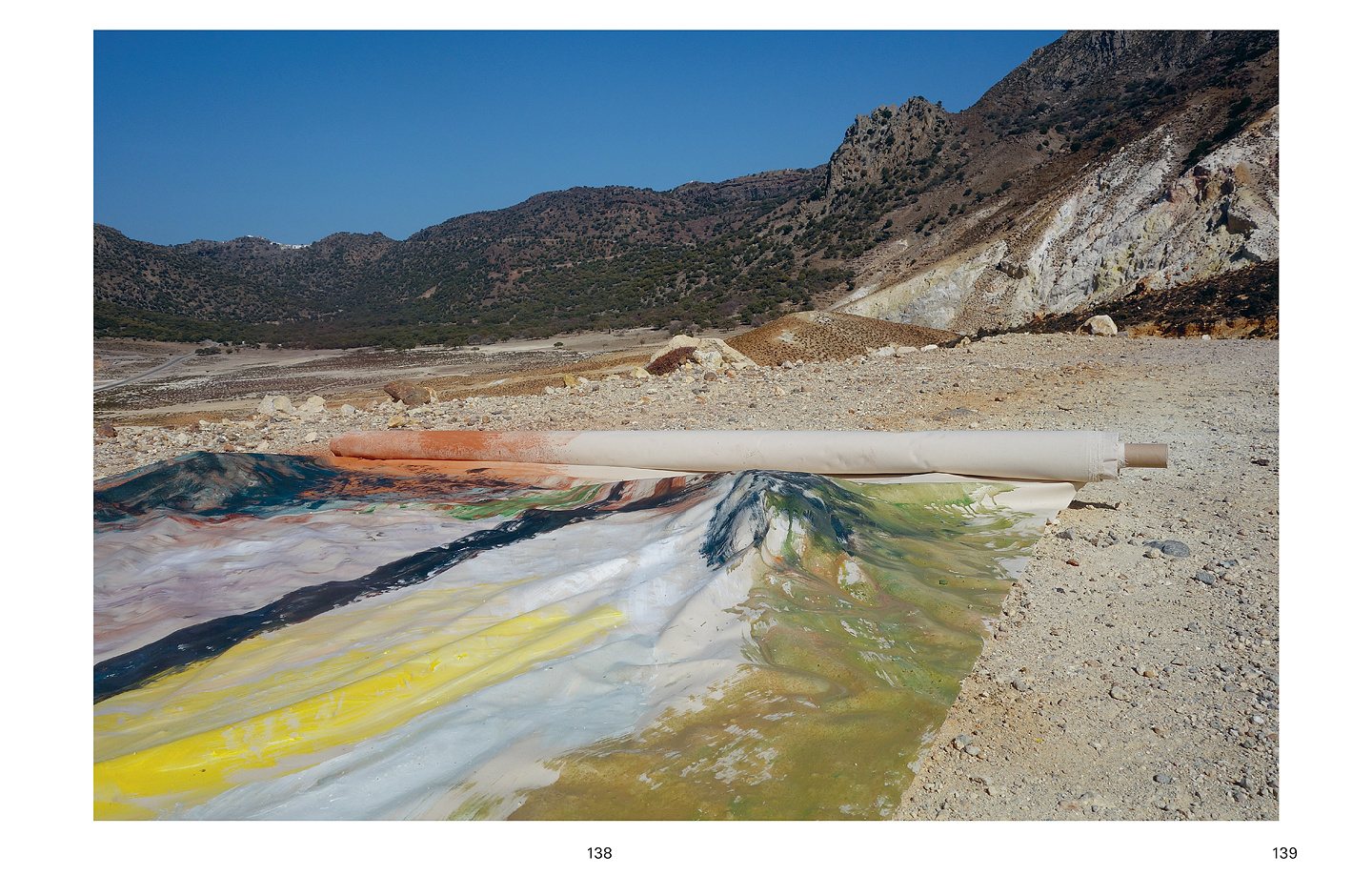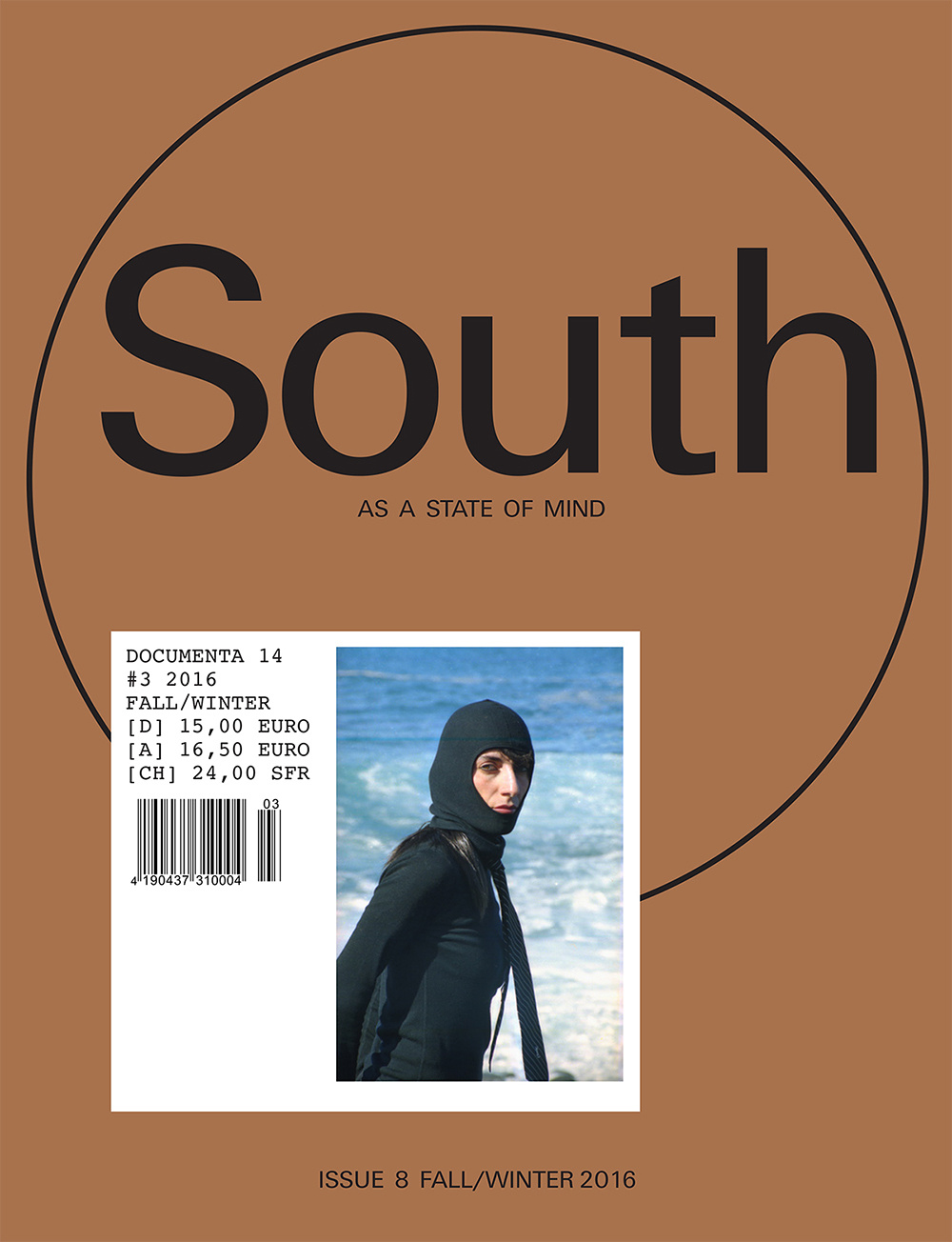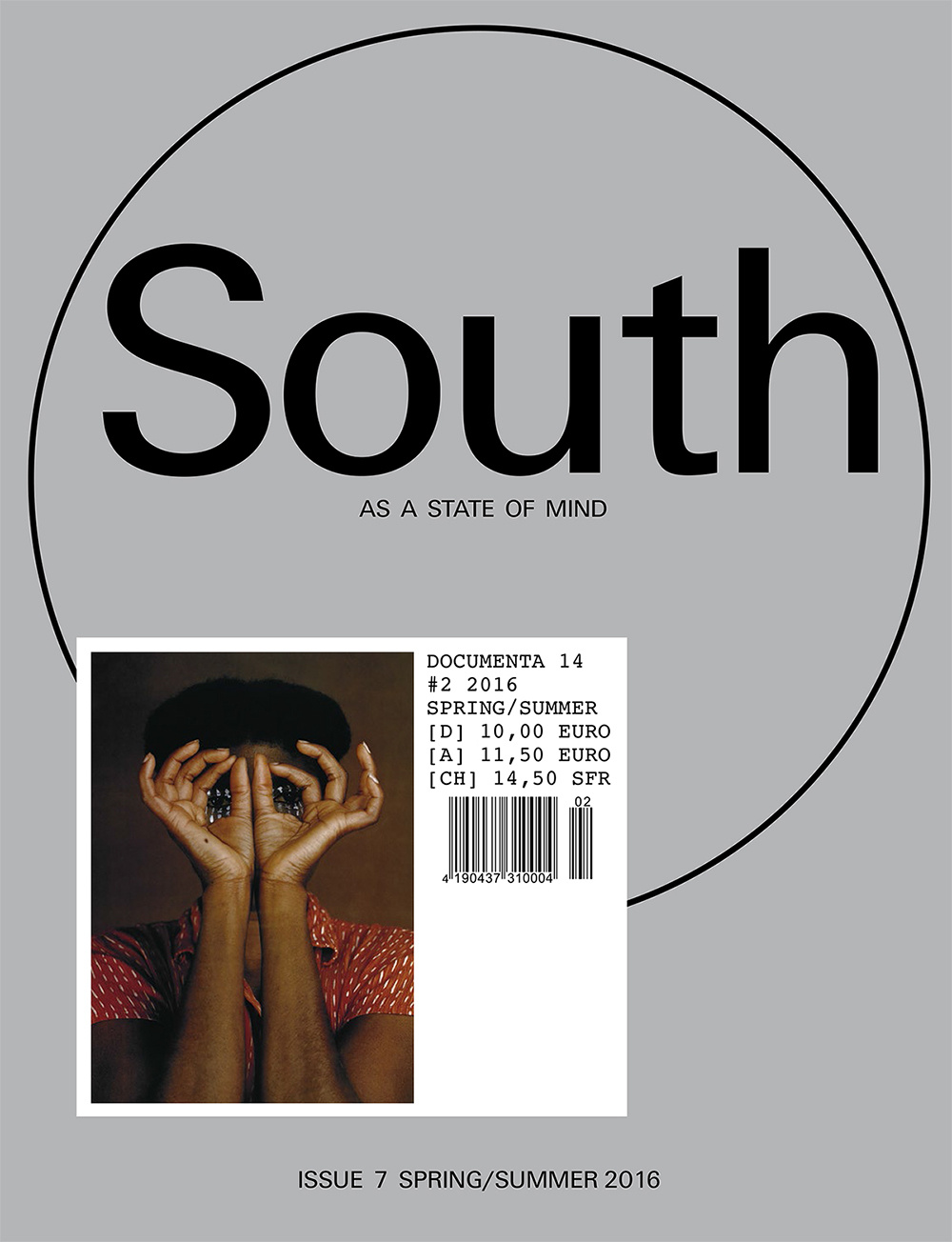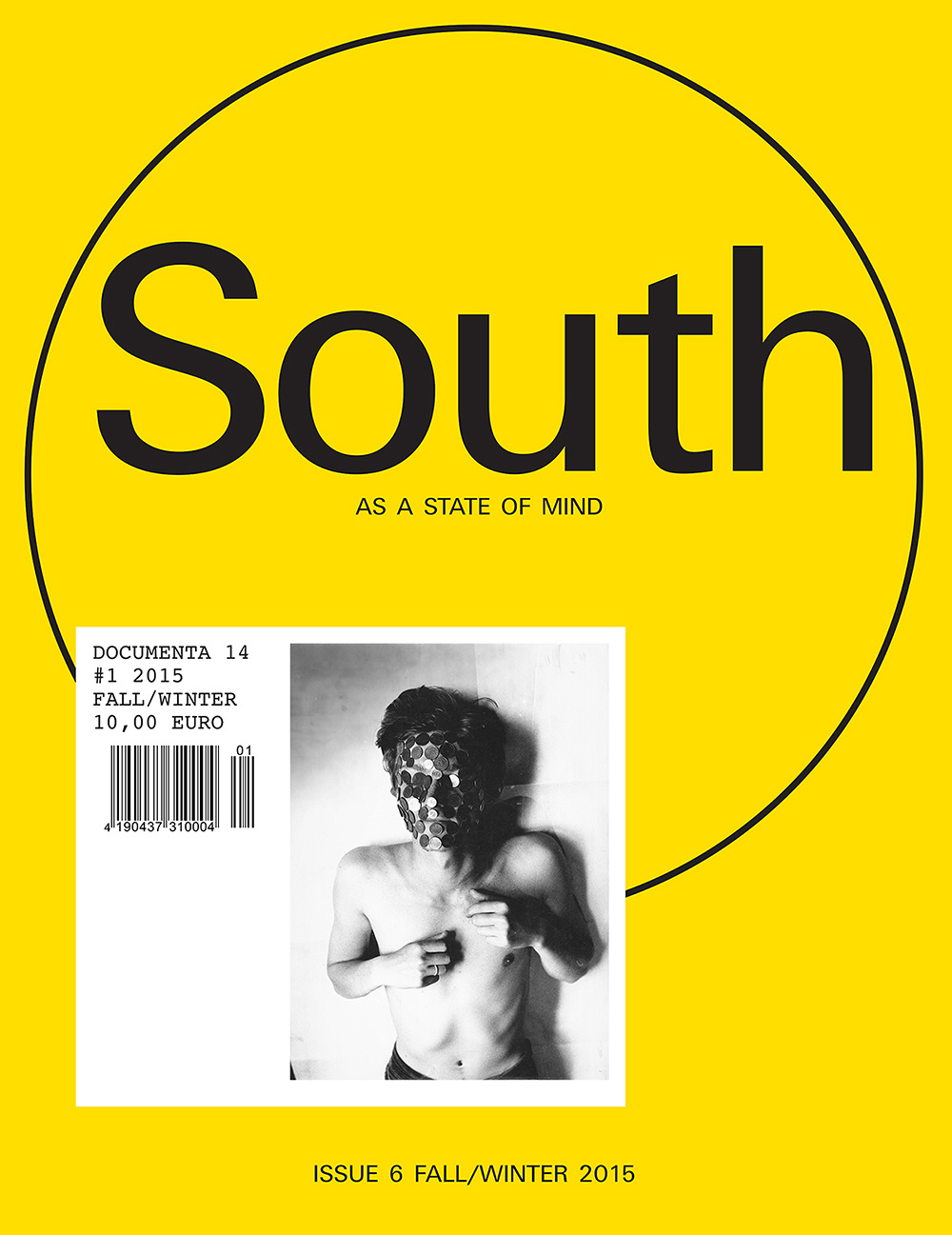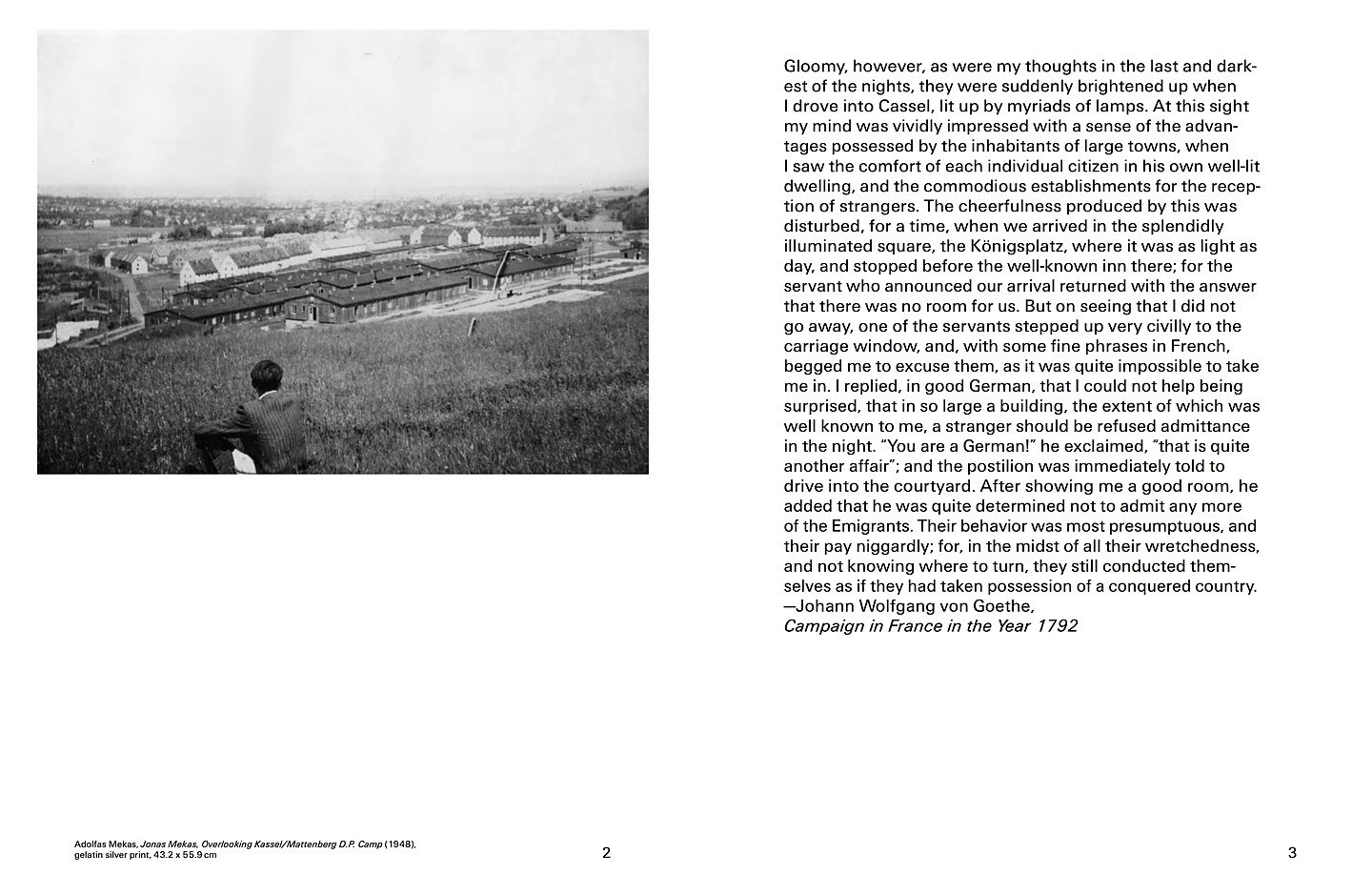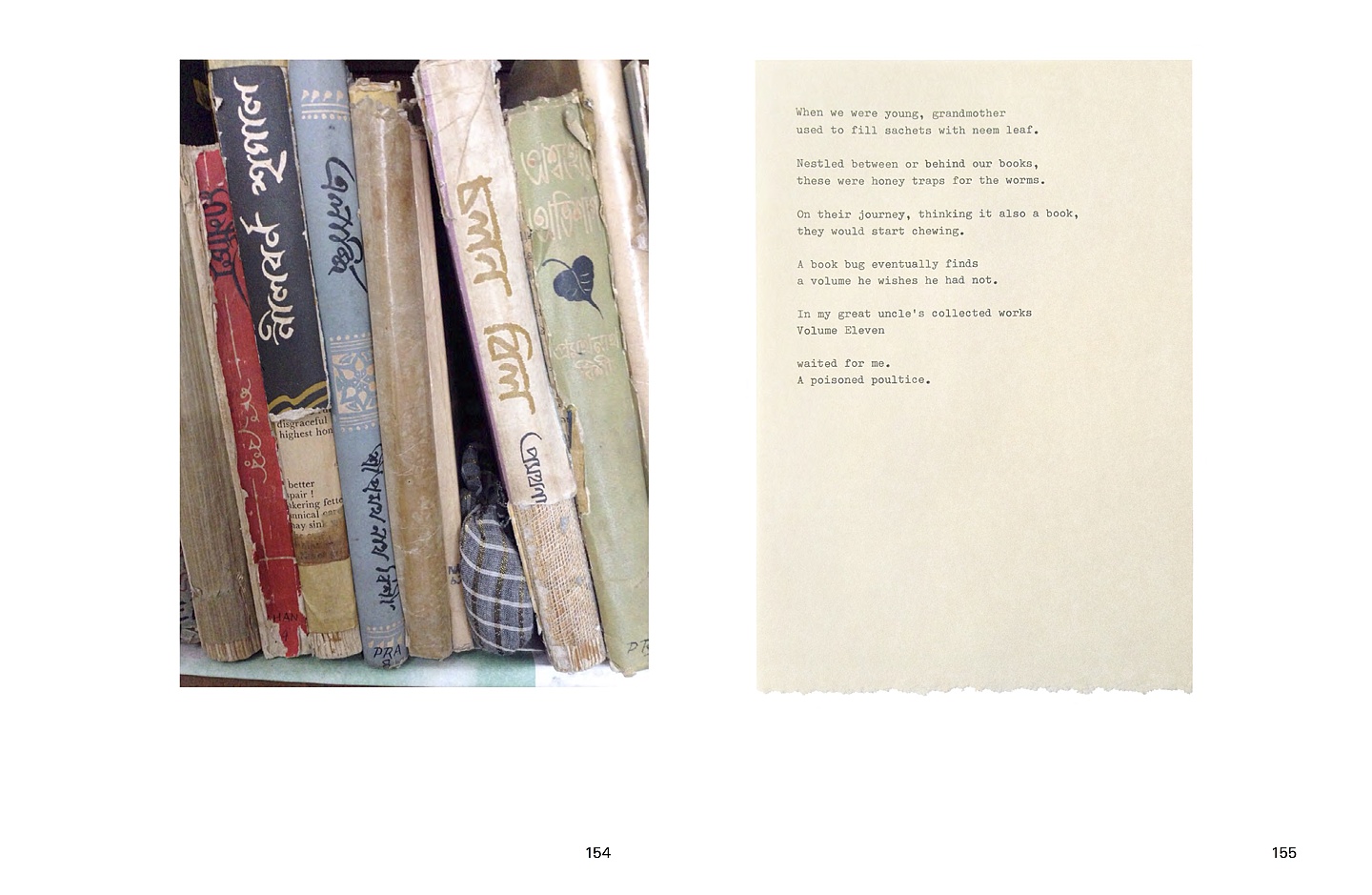South as a State of Mind
South as a State of Mind is a magazine founded by Marina Fokidis in Athens in 2012. From early 2015, the magazine temporarily became the documenta 14 journal, publishing four special issues edited by Quinn Latimer, documenta 14’s Editor-in-Chief of publications, and Adam Szymczyk, documenta 14’s Artistic Director. The fourth and final guest issue will be published in the summer of 2017. From its inception, the documenta 14 South was conceived as a site of research, critique, art, politics, and literature that would parallel the years of work on the documenta 14 exhibition, helping to define and frame its concerns and aims. As such, the journal has become a manifestation of documenta 14 rather than a discursive lens through which to merely presage the topics to be addressed in the exhibition. Writing and publishing, in all their forms, are an integral part of documenta 14, and the journal heralds that process. Additionally, the online edition of the documenta 14 South features content from the print magazine in three languages: English, Greek, and German.
Read online
Issue #9 [documenta 14 #4]
Over the past year, we have repeatedly found ourselves reaching for books and texts about violence. Perhaps with the urge to understand that which swells like waves around us, threatening to take us under in all its manifold, rising forms: economic violence, linguistic violence, nationalistic violence, environmental violence, gender and racial violence. In this fourth and final issue of the documenta 14 journal South as a State of Mind, it seemed necessary to name it, finally, as one of the structuring devices of our world. From this decision came a question: What might counter this culture of violence both in spirit and in action? What apposite force? What to generate in the face of it? Our question remains; yet in considering it anew, we realize that this is the query that has guided our editorial vision of the documenta 14 journal, and its four special issues of South, forward. Under the dark star of this question—what might we offer, and what forms might these offerings take?—this issue’s working theme is “violence and offering.” If the latter term implies both a gift and a sacrifice, it likewise describes a different kind of relationship to one’s community, society, or other. Thus the work in this issue of South—its essays, poems, letters, and images—examines how violence structures our relations in and with the world, as well as the disparate offerings (linguistic, visual, auditory) continually created as a cultural movement of opposition to it. Antonin Artaud once wrote: “There aren’t enough magazines, or if you will, all existing magazines are useless. We are appearing because we believe we are responding to something. We are real. This excuses us from being necessary. There should be as many magazines as there are valid states of mind.” In 2015, when we began editing South, we did so because we believed we were responding to something. Perhaps, as Artaud notes, this belief excused us from being necessary. But we believed then, as we feel now, that there should be as many magazines as there are states of mind, Southern and other. The documenta 14 journal has been the manifestation of one (or rather, many) of them. We thank you for reading.
With contributions by Domenick Ammirati, Antonin Artaud, James Baldwin, Cassandra Barnett, Walter Benjamin, Lorenza Böttner, Jane Bowles, Andris Brinkmanis, Jon Bywater, Banu Cennetoğlu, Yll Çitaku and Nita Deda, Yael Davids, Angela Y. Davis, Richard Fletcher, Marina Fokidis, Susan Hiller, Kim Hyesoon, Naveen Kishore, Katerina Koskina, Asja Lācis, Quinn Latimer, Robin Coste Lewis, Ulrich Loock, John Miller, Rosalind Nashashibi, Sean O’Toole, Véréna Paravel and Lucien Castaing-Taylor, Hila Peleg, Paul B. Preciado, Laura Preston, Gene Ray, Ben Russell, Ahlam Shibli, K. G. Subramanyan, Vivian Suter, Adam Szymczyk, and Diana Taylor
South as a State of Mind #9 [documenta 14 #4]
Fall/Winter 2017
Edited by Quinn Latimer and Adam Szymczyk
300 × 230 mm, 280 pp., numerous color and black-and-white illustrations, English
ISSN 2241-3901
ISBN 978-3-86335-847-1
15 Euro
Issue #8 [documenta 14 #3]
Ecology has as its Greek root oikos, meaning the entire habitat, house, or family—an interdependent ecosystem. (Economy has the same root.) We know it now as the study of the relationship between organisms and their environment, the interdependence of humans and their institutions. As Chickasaw poet Linda Hogan notes: “Here is a lesson: what happens to people and what happens to the land is the same thing.” And this is what the work that follows weighs. The third volume of the documenta 14 South as a State of Mind concerns the constant correlation among nature, capital, power, and language. The contributions that follow are documents of language, or hunger, or both. Why “language or hunger”? Consider the mouth a border, a boundary, a threshold: to swallow or to speak. Emptiness or language (or their meeting). On one side, inside, one feels physical hunger, a void; on the other side, outside, one puts forth language (into another void, perhaps). Hence language—being born with one, or finding it again, or creating one anew, a kind of lexicon—can be a means of nourishment, while hunger can be a form of resistance. Indeed, the new essays, poems, scripts, artists projects, and older manifestos and parables that together constitute this issue of South articulate the necessity of language, while considering consumption and hunger as political and aesthetic facts and fields that determined our past and will construct our collective future. “In contemporary times,” Nabil Ahmed writes, “emergent ecological crisis is a paradigmatic negative moment with regard to the unresolved dark twinning of capitalism and colonialism.” And it is this dark twinning that is our focus. If, as Ahmed declares, attentiveness to environmental violence is necessary for the “formation of an anticapitalist political ecology at once structural, social, psychic, and environmental,” we believe that an awareness of the role that language plays in this formation, as complicity or resistance, psychic or structural, is equally important. Language or hunger—a kind of border. A question (for you), also.
With contributions by Nabil Ahmed, Nairy Baghramian, Sotirios Bahtsetzis, Stefan Benchoam, Ross Birrell, Moyra Davey, Hendrik Folkerts, Gauri Gill, Natasha Ginwala, Gordon Hookey, Tshibumba Kanda Matulu, Christos Karakepelis, Lala Rukh, Quinn Latimer, Tina Modotti, Joaquín Orellana, Neni Panourgiá, Synnøve Persen, Pope.L, Gene Ray, Lisa Robertson, Glauber Rocha, Dieter Roelstraete, Roee Rosen, Julio Santos, Savitri Sawhney, Monika Szewczyk, Adam Szymczyk, Alejandro Torún, Rajesh Chaitya Vangad, Cecilia Vicuña, and Vivian Ziherl
South as a State of Mind #8 [documenta 14 #3]
Fall/Winter 2016
Edited by Quinn Latimer and Adam Szymczyk
300 × 230 mm, 260 pp., numerous color and black-and-white illustrations, English
ISSN 2241-3901
ISBN 978-3-86335-846-4
15 Euro
Issue #7 [documenta 14 #2]
Silence as resistance; masks as resistance. Both, perhaps paradoxically, as means to act and to speak, as modes of aesthetic and political participation. If words and images can be put to the service of critical inquiry, silence and masks, while withdrawing the claim on self-evident truth, can help give sharp contours to political statement, testifying to the need to address the real—without, however, falling into the pitfalls of direct representation. In essay and allegory, artist projects and conversation, poetry and fiction, this second volume of the documenta 14 South as a State of Mind explores issues of masking identity and silencing dissent, orality and recognition, indigeneity and exile, provenance and repatriation, and colonial and gendered violence. We examine and don masks, understanding them as historical and contemporary means of occlusion or subversion often employed to defy the ways in which our bodies are unequally accorded basic rights in the dehumanizing nexus and global economy of citizenship, geography, race, and gender. In parallel, we survey silence—one of the many masks of language—as a response to the empty authority and authoritarianism of so much communication, a long linguistic flood of nationalistic propaganda, neoliberal preaching, and coded violence. Indeed, we know silence as a necessary aspect of language, as a way to propose a kind of radical reception. For to be silent suggests not only resistance but recipience and recognition. As Stathis Gourgouris observes, “One listens to the universe before anything else.” Withholding or receptive, adorned and defiant, often displaced and transforming, the voices and bodies that fill this volume of South demonstrate that silence and masks are often the means by which aesthetics and politics, cultural production and political protest, meet and cross over. “But who is speaking in this room full of eyes?” Alejandra Pizarnik asks. “Who gnaws with a mouth made of paper? Names that come up, shadows with masks.” We wish you good reading.
With contributions by Maria Thereza Alves, Andreas Angelidakis, Mustapha Benfodil, María Magdalena Campos-Pons, Barbara Casavecchia, Mariana Castillo Deball, Clémentine Deliss, Mahasweta Devi, Elsa Dorlin, Hendrik Folkerts, Regina José Galindo, Stathis Gourgouris, John Hejduk, Candice Hopkins, Joan Naviyuk Kane, Frédéric Keck, Quinn Latimer, Alejandra Pizarnik, Jolene Rickard, Léopold Sédar Senghor, Gayatri Chakravorty Spivak, Subcomandante Marcos, and Adam Szymczyk
South as a State of Mind #7 [documenta 14 #2]
Spring/Summer 2016
Edited by Quinn Latimer and Adam Szymczyk
300 × 230 mm, 228 pp., numerous color and black-and-white illustrations, English
ISSN 2241-3901
ISBN 978-3-86335-845-7
10 Euro
Issue #6 [documenta 14 #1]
Possession and dispossession, displacement and debt—it seems like the stories that condition our present are inextricably born out of the stories that conditioned our past. The first of four special issues of South as a State of Mind, temporarily reconfigured as the documenta 14 journal, examines forms and figures of displacement and dispossession, and the modes of resistance—aesthetic, political, literary, biological—found within them. New essays, both literary and visual, consider dispossession as a historical and contemporary condition, and its connections to archaeology and architecture, coloniality and performativity, debt and imperialism, provenance and restitution, feminism and protest. Featured too are historical documents of displacement and debt, as well as a photo essay on the building and burning of knowledge that explores libraries and temples, our edifices of learning and power, as emblems of hegemony as well as shelters for ideas. While the intensity of our present political conditions and the challenges of our global economic world order cannot be overstated (“Am I exaggerating? Perhaps I am under-exaggerating,” as poet Bhanu Kapil writes in our pages), still the means of protest are rich, diverse. The collective of voices here, and the often dissident and marginalized histories they limn and draw from, offer an alternative cartography and chorus; in so doing, we imagine that they might allow us to delineate alternatives to our untenable present and unclear future. “The learning process is something you can incite, literally incite, like a riot,” writes Audre Lorde. We hope so.
With contributions by Alexander Alberro, Katerina Anghelaki-Rooke, Aristide Antonas, Hannah Arendt, Pierre Bal-Blanc, Miriam Cahn, Manthia Diawara, Angela Dimitrakaki, Maria Eichhorn, Fouad Elkoury, Marina Fokidis, Peter Friedl, Hans Haacke, Bhanu Kapil, Quinn Latimer, Yorgos Makris, Jonas Mekas, Marta Minujín, Naeem Mohaiemen, Bonaventure Soh Bejeng Ndikung, Linda Nochlin, Paul B. Preciado, Thomas Sankara, Brandon Shimoda, Sven Stilinović, Adam Szymczyk, Françoise Vergès, Kaelen Wilson-Goldie, and Stefan Zweig
South as a State of Mind #6 [documenta 14 #1]
Fall/Winter 2015
Edited by Quinn Latimer and Adam Szymczyk
230 × 300 mm, 262 pp., numerous color and black-and-white illustrations, English
ISSN 2241-3901
ISBN 978-3-86335-844-0
10 Euro
